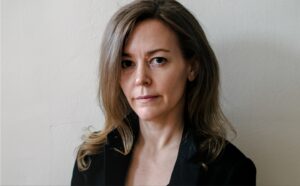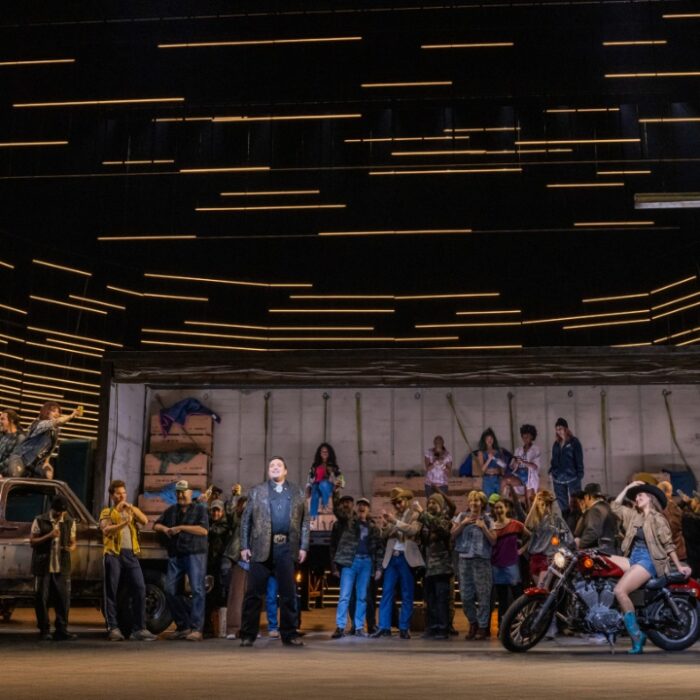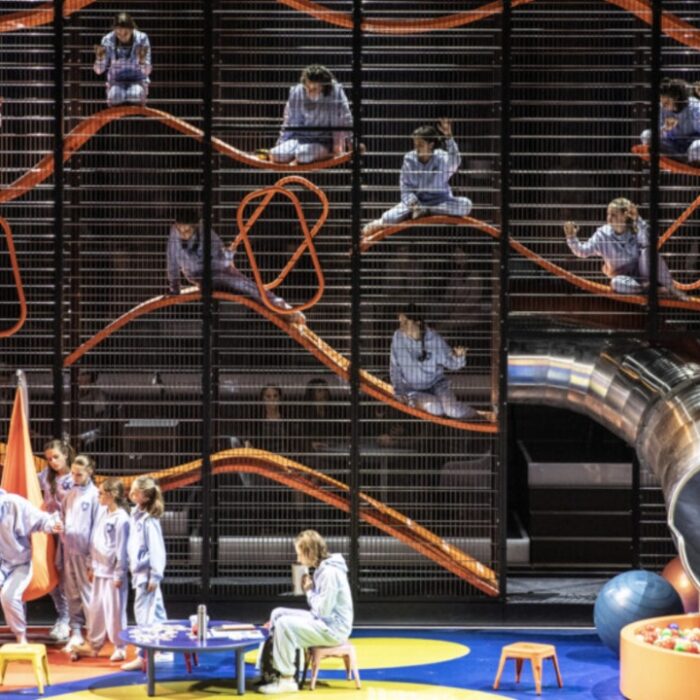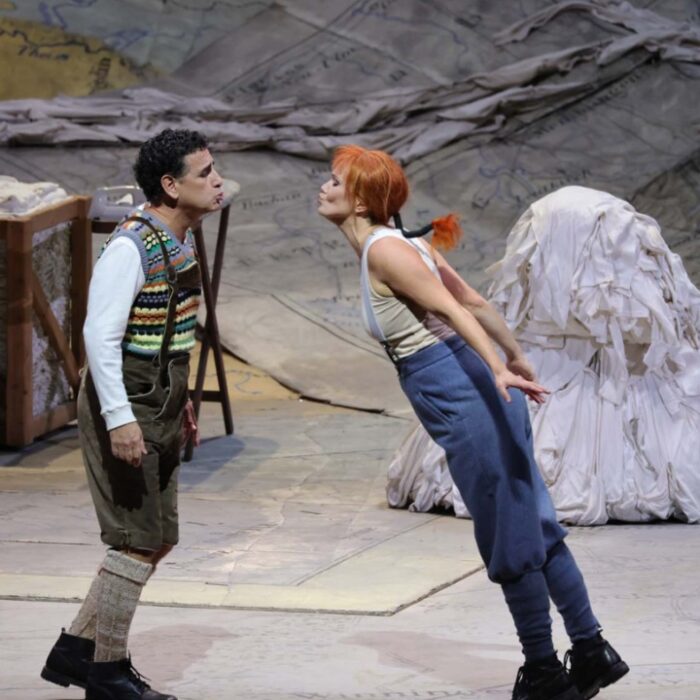
Sofia Opera & Ballet 2025 Review: Der Ring des Nibelungen
Director Plamen Kartaloff’s Ring Cycle Continues to Inspire for Generations to Come
By Jennifer Pyron(Photo: Sofia Opera & Ballet)
Director Plamen Kartaloff’s newest production of “Der Ring des Nibelungen” holds a very special place in the opera world. Sofia Opera and Ballet premiered this production in 2023 and OperaWire reviewed its arrival and aesthetic developments in full, detailing how “in a country with a population of less than seven million people, the cycle was cast almost entirely using home-grown talent.” This year’s festival celebrates the continuation of local community support that still resonates and fascinates audiences from all over.
Leading this year’s production of the Ring Cycle is American conductor Evan-Alexis Christ. He marks a musical turning point that highlights Sofia’s sustained distinction among Wagner lovers and historians. Christ has worked with Sofia Opera since 2020, leading productions of Strauss’ “Elektra” and “Ariadne auf Naxos,” and Wagner’s Ring Cycle and “Lohengrin.” His wide range of dynamics, collaborations, and mutual respect among Sofia Opera Orchestra’s musicians ushers his interpretations forward, bringing to the forefront some of the greatest singing performances to date.
Kartaloff’s production, which includes Hans Kudlich’s set design, illuminated by Andrei Hajdinjak’s spectacular lighting design, Elena Shopova’s multimedia and Hristiyana Mihaleva-Zorbalieva‘s costumes, made for another thrilling celebration of the Ring Cycle.

(Photo: Sofia Opera & Ballet)
Das Rheingold
Dramatic baritone Thomas Hall as Wotan set the tone for this year’s Ring Cycle, beginning with “Das Rheingold.” He wasted no time honing in on what matters most in every Ring Cycle: the music and singing. His voice was a powerful and clear example of the physicality it takes for a dramatic baritone to sustain their voice effectively throughout an entire Ring. Hall’s demeanor commanded attention and demanded precision from himself in order to deliver the absolute best singing that a Wagnerian baritone can muster. Most notable among his talents, apart from his singing, was his stature within Kartaloff’s production. The timeless, space-like, post apocalyptic realm of this entire Ring Cycle production catapults the singers into the audience’s mind’s eye. There is nowhere to run or hide, especially vocally, and Hall’s Wotan transcended this aesthetic’s ambiguity by means of his own interpretation and in his own world. It seemed his Wotan could not escape the fortress of his own karmic pitfalls and deliverance, simply because he did not aim to. He is a Wotan damned to be in the depths of his own god-making and this is exactly what made his vocal performance lasting and relevant. The direction of his performance’s focus stemmed from the radical examination of his character’s severity and need for power, especially by ‘ruling’ his own family’s destiny by force. His voice while singing ‘Abendlich strahlt der Sonne Auge’ sounded solid and set him apart from his castmates due to his sheer determination. The level of performance he brought to the stage was matched by every cast member.
Baritone Plamen Dimitrov as the Nibelung dwarf Alberich captivated the audience with his sinister demeanor and vocal performance as he plotted to trick the Rheinmaidens and steal the gold. His physicality also served him well as he hustled about the stage in miserly desperation, grasping at the Rheinmaidens and hurling his weight towards them to distract and dismantle their guarding of the gold. He came to life especially as he sang ‘Hieher dorthin hehe hoho!’ The orchestra’s dramatic playing sounded exquisite in this moment too. Christ’s conducting really leaned into the dynamic possibilities with excitement and energy that stirred the audience. The violins were particularly dramatized as they plunged into Wagner’s composition and gave new meaning to Alberich’s radical haste.
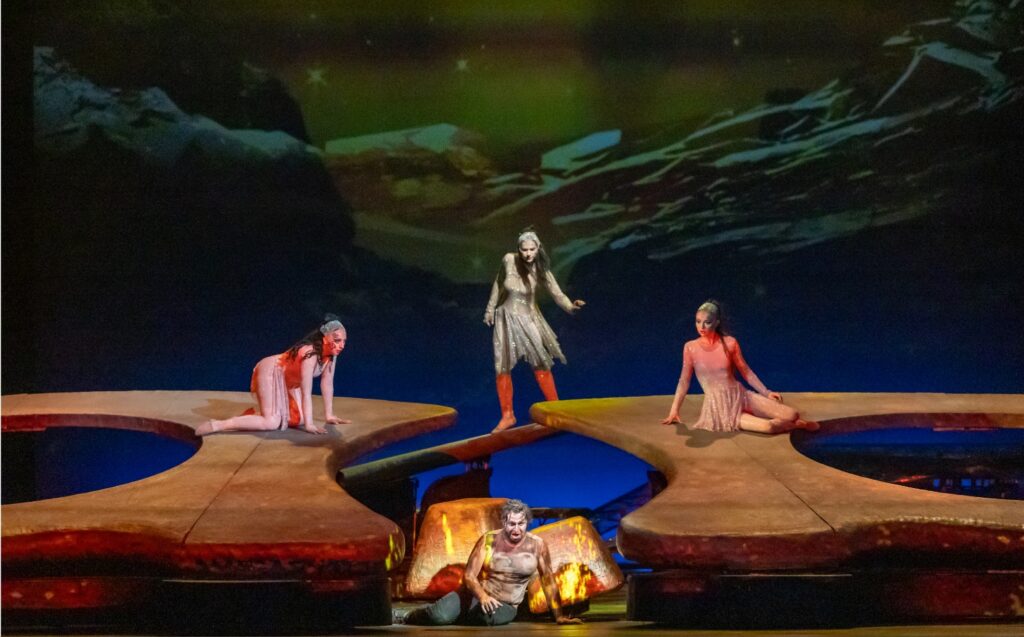
(Photo: Sofia Opera & Ballet)
The three Rheinmaidens, Stanislava Momekova as Woglinde, Ina Petrova as Wellgunde, and Alexandrina Marinova Stoyanova-Andreeva as Flosshilde, were the perfect combination of magical beauty and mystical existence. Their costumes, designed by Hristiyana Mihaleva-Zorbalieva, were luminous and allowed for them to move and jump about the set’s open concept design. There were trampolines in the center of the large circles that formed the set and the Rheinmaidens had fun flirting and flitting about this layout. They were all three in great physical shape while singing and jumping, maintaining their utmost concentration on their vocal performance. They exemplified solid breath support and vocal agility while adapting to the creative terrain of this production.
Mezzo-soprano Vesela Yaneva as Erda was a highlight of the evening as she sang ‘Weiche Wotan weiche.’ Her voice’s warm vocal palette sounded expansive and grounded at the same time. Mezzo-soprano Niina Keitel as Fricka gave a remarkable performance in her role. Her voice balanced Hall’s baritone and the two complimented one another very well. Both Erda and Fricka’s costumes were brilliantly designed. Mezzo-soprano Silvana Pravcheva as Freia was glorious in her role and her vocal agility was excellent. She looked radiant in her costume like a bright rising sun. Bass Svetozar Rangelov as Donner was warm and majestic in his role. His voice sounded pure and intentional as he sang, clearing the path of the gods and blessing them with their new arrival in Valhalla. His presence was like a beacon of light. His detailed costume really served a beautiful purpose when he was onstage. Every element came to life in this production as the singers moved about and the design was rich with symbolism.

(Photo: Sofia Opera & Ballet)
Tenor Daniel Ostretsov as Loge sounded exquisite in this role. He performed as Loge in 2023 as well and OperaWire captured initial impressions of his voice. What made his performance stand out the most this year was his role within the cast. It seemed his voice was a welcome breath of fresh air among the heavier timbres. His interpretation of ‘Umsonst sucht ich’ was a revelation about the core meaning of Wagner’s “Das Rheingold,” and how trading Freia for all the power of the world would be in vain. His voice managed to create a sense of urgency through dire warning of what would come.
Tenor Krassimir Dinev as Mime was a major highlight of the Ring Cycle, especially his performance in “Siegfried.” However, when we first met him in “Das Rheingold,” his voice and presence were just coming to life and this was apparent in Wagner’s score. During his performance of ‘Sorglose Schmiede schufen wir,’ his voice emerged from the pits as he told of how welding gold for greed creates splinters of evil that shimmer and lie hidden in shafts. Wagner’s depth knows no bounds and Mime digs deeper in the crevices that he is familiar with to uncover the hardest truths. Dinev really impressed all of us with his expressivity and focused willpower as he performed Wagner’s score. His vocal inflections and subtle nuances gave character to Mime but never took away from the darkness and destruction of greed’s path unfolding before him. His makeup and costume were perfect and his performance left the audience wanting more from him, especially come “Siegfried.”

(Photo: Sofia Opera & Ballet)
The orchestra, especially during ‘Sorglose Schmiede, schufen wir’ worked in tandem with young people onstage inside metallic structures that revealed them toiling for their new master, crafting metal in the fire and heat of a smoldering plant. The stage’s set design in this scene was spectacular and the metal tinkering playing along with the orchestra made a harsh sound that amplified Wagner’s compositional intention, ushering in a new wave of paranoia around the illusory importance of gaining power through gold. Christ made sure this was front and center, maintaining percussive precision and awareness the whole time.

(Photo: Sofia Opera & Ballet)
Basses Petar Buchkov as Fafner and Stefan Vladimirov as Fasolt were larger than life both physically and vocally. Their costumes were designed to resemble giants and made them look terrifying in stature and stamina. Buchkov and Vladimirov’s acting skills were outstanding and these two toiling brothers were complete in the aggressive weightiness of their very existence. Audience members watched in awe as they maneuvered as massively and menacingly as possible among the rest of the cast. Their feet stomped in defiance and their inner urges to get what they wanted manifested vocally as they sang in their rich bass timbres.

(Photo: Sofia Opera & Ballet)
Tenor Hrisimir Damyanov as Froh sounded less vocally dynamic than the other singers but his voice delivered a beautiful array of colors.
Overall, the opening of Kartaloff’s Ring Cycle made a lasting impression. “Das Rheingold” showcased the remarkable cast and orchestra working with conductor Christ to deliver a most meaningful dedication to Wagner.

(Photo: Sofia Opera & Ballet)
Die Walküre
Hall once again stood tall and elicited Wotan’s proclamation of hellfire, come what may, out of the crushing hopelessness he felt towards his very existence and responsibilities. “Die Walküre” showcased some of his most outstanding work. Hall’s vocal performance of ‘Nun zaume den Ross,’ ‘Was keinem in Worten ich kunde,’ and ‘Ein andres ist’s’ were unforgettable moments. However, the game-changing, level-up vocal highlights occurred while he sang ‘Wo ist Brünnhilde,’ ‘War es so schmalich,’ and ‘Leb wohl du kühnes herrliches’ with mezzo-soprano Gergana Rusekova as Brünnhilde. Rusekova’s voice took on another dimension within Wagner’s composition. The vocal stamina of Hall’s voice when paired with Rusekova increased exponentially. It felt like the energy between the two singers developed into a thunderous roar of glorious resonance that took audience members into a deeper realm of feeling within Wagner’s composition.
“Die Walküre” guts the heart of the Ring Cycle based on its libretto and how much Wagner stirs the ‘damnations’ of everyone’s destinies, especially Brünnhilde’s. Hall embodied the score and when the fires washed over Brünnhilde’s body in the center of the stage, the entire audience leaned forward, examining the transmutation in shock and deep reverence.

(Photo: Sofia Opera & Ballet)
Tenor Martin Iliev as Siegmund was a welcome addition of both voice and presence in this production. His performance just days before, singing the titular role in Kartaloff’s new production of “Tannhäuser,” merited him worthy praise that continued to resonate during his performance in “Die Walküre.” Iliev’s voice especially as he sang with Sieglinde, ‘Was Herd dies auch sei,’ ‘Friedmund darf ich nicht heissen,’ ‘Dich selige Frau,’ ‘Winterstürme wichen dem,’ and ‘Siegmund heiss ich’ sounded gut-wrenching. Iliev’s ability to empathically portray any of the roles he takes on is unmatched. His performance during Act Two — ‘Kehrte der Vater nun heim!’ with Sieglinde, Hunding, Brünnhilde, and Wotan — is revolutionary. He fights to the bitter end to protect and love Sieglinde, while also serving his own destiny. One might be reminded of Iliev’s final moments in “Tannhäuser,” when he proclaims his will and hands over his final moments to Wagner’s moving score. Both of these moments during Sofia Opera and Ballet’s Wagner Festival 2025 were historic. Iliev’s performances were life-changing.
Soprano Tsvetana Bandalovska as Sieglinde gave the performance of a lifetime, especially in scenes with Iliev. Her voice as Princess Elisabeth in “Tannhäuser” was still lingering in my memory as I watched her perform in “Die Walküre.” Her vocal technique and stamina are fine examples of how a soprano can manage back-to-back and demanding Wagnerian roles. She sounded precise in her vocal phrasing and the orchestra never overpowered her. Bandalovska is also a first-class actor. She managed her vocal agility and resonance perfectly while portraying a deteriorating woman on the run from damnation simply by existing. In the moments where she sang with Siegmund, including ‘Ein Schwert verhiess mir der,’ ‘Du bist der Lenz,’ ‘O susseste Wonne,’ and ‘Raste nun hier,’ her voice blossomed and then left her body as she experienced his soul-crushing death. Bandalovska made audience members forget time and space during her performance. Kartaloff’s production will be marked as a turning point due to her and Iliev’s unforgettable performances. “Die Walküre” will always be about Bandalovska and Iliev, in my mind’s eye.

(Photo: Sofia Opera & Ballet)
Bass Bjarni Thor Kristinsson as Hunding gave a bold performance in his role. His voice as he sang ‘Mud am Herd,’ ‘Afgemat bij de haar,’ and especially, ‘Kehrte der Vater nun heim’ far exceeded expectations. Kristinsson’s bass sounded full-bodied and sonorous in his delivery. In Act Two, when he used his blades to murder Siegmund, there was an awed hush that fell over the audience, begging for him to stop his madness and praising his vocal exactness at the same time. Hall as Wotan and Rusekova as Brünnhilde looked on in that moment while Bandalovska collapsed in shock and insurmountable grief. Keitel as Fricka used her voice in defiance of Wotan’s plans and high hopes for Siegmund and Sieglinde. ‘Der alte Sturm’ and ‘Nichts lerntest du’ was rich with torment as she sang.

(Photo: Sofia Opera & Ballet)
Die Walküre for this performance included Stanislava Momekova as Helmwige, Silvia Teneva as Ortlinde, Liliya Kehayova as Gerhilde, Ina Petrova as Waltraute, Elena Mehandzhiyska as Siegrune, Tsveta Sarambelieva as Rossweisse, Alexandrina Stoyanova-Andreeva as Grimgerde, and Vesela Yaneva as Schwertleite. The women were magnificent in their performances! When they entered the stage along with their trusty stage guides and mounted upon brilliant red horses, the whole audience clapped and showed their excitement.
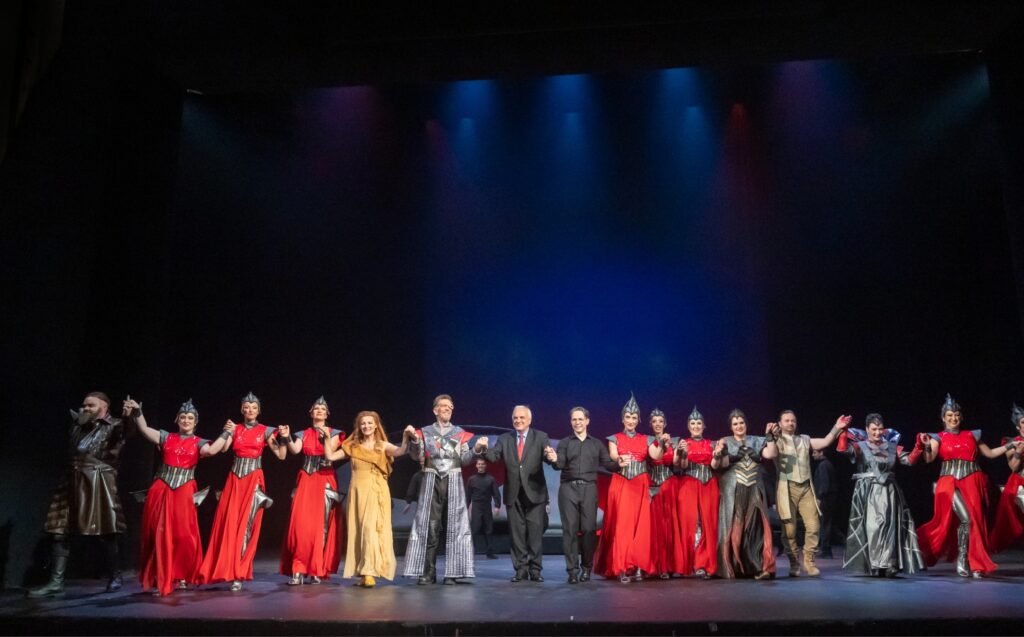
(Photo: Sofia Opera & Ballet)
Kartaloff’s production of “Die Walküre” continues to be one of the most impactful in its design, execution, and devotion in its delivery of Wagner’s libretto and score. This performance is worthy of documentation and highlighting for its efforts in stage direction. Every moment seemed to flow naturally and despite the oversized set props that were maneuvered all at once, everything and everyone came together perfectly. I would absolutely see this again, for the thrill of the Valkyries’ entrance alone! Brava!

(Photo: Sofia Opera & Ballet)
“Siegfried”
Danish Jugendlicher Heldentenor Magnus Vigilius in the titular role was the gemstone of this year’s “Siegfried.” His radiant voice was full of life, exuding the naiveté, reckless abandon, and passionate determination of Siegfried. He embodied a true sense of fearless invincibility in his spirit and this made him both captivating and breathtaking. His physical stature was handsome and radiant in the soft streaming spotlight that followed his movements and expressions. I lost track of keeping time during his performance because I was absolutely enthralled with how energetically he navigated the stage’s minimal yet complex set design, manoeuvring effortlessly among the raised platforms of the two center ring designs. Vigilius made Kartaloff’s production a real life art installation of highest form and matter. His costumes depicted silver feathers that turned to red and glowed with his burning desire to defeat his oppressors. He rose above the circumstances he was dealt and invited the audience to go along with him on his journey: a hero in the making by means of hell-bending efforts and gut-burning gumption. There seemed to be nothing Vigilius’ Siegfried could not do well.
Vigilius’ vocal quality is one-of-a-kind, in addition to his personality and embodiment of the character. Even when he smiled he became a light beaming on a stage full of darkness and desperation. Witnessing him live and in action was a special moment: an absolute triumph in every way possible. His voice during ‘Nothung nothung neidliches’ as he was crafting and proclaiming his sword was stunning. The orchestra’s glorious sound rolled over the pit and spilled into the audience. It felt like Wagner himself was in the room, witnessing history being made with all the precise elements he had envisioned for this moment. Vigilius gave a superb performance and this was an unforgettable moment for Sofia Opera and Ballet’s Wagner Festival 2025.

(Photo: Sofia Opera & Ballet)
Dinev continued to lead the way as Mime, giving yet another notable performance. His interactions with the different version of Siegfried running across the stage — as an infant, then a youth, then a young man — were hilarious, the stage direction having him chasing Siegfried about and trying to ‘discipline his difficult child.’ Wagner’s libretto avoids overshooting Mime’s aggressive and manipulative behaviors so that the composition can freely flow and further develop the ‘hero’s journey.’ Dinev therefore used this to the best of his abilities, playing up the ridiculousness of himself as a Nibelung dwarf fostering a Wälsung. His voice while singing ‘Als zullendes Kind’ was particularly bold and bright. Dinev’s performances are like observing a masterclass in both singing and acting. His physical activeness and demeanor brought a unique energy of intention to his vocal quality every time he was on stage. In short, Dinev has ‘star quality.’
Hungarian bass-baritone Krisztián Cser as the Wanderer was a vocally balanced choice for this role. His voice during ‘Du bist nicht’ resonated in Sofia Opera’s hall in abundant delight and wonder. He looked the part onstage with his costume and bouncy globe and staff in hand. Cser’s portrayal of the Wanderer made it easy to remember why Wagner included this character: to illuminate the evolution of order and curiosity of man. The Wanderer is not alone in his journey and actions. He is ultimately a soothsayer and forges the right of natural order to prevail so that Wotan’s force can longer be sustained. Cser’s calm and serene demeanor even when teasing Mime made him very effective as an actor and this is vital to any “Siegfried” production. The veil of illusion cast over the audience through Wagner’s genius stayed intact and Cser is a good example of how this happened: excellent singing paired with drama through means of Wagner’s complex composition amounting to gesamtkunstwerk.

(Photo: Sofia Opera & Ballet)
Soprano Radostina Nikolaeva as Brünnhilde was destined to rise to the same standard set by Vigilius’ Siegfried, as Nikolaeva became his fateful partner and one true love in this production. When she was awakened by Siegfried, Nikolaeva’s voice sounded innocent yet wise. Her hesitations of being touched by Siegfried were honorable in that she had been waiting for so long and placed there by Wotan as her only known destiny. Brünnhilde’s warmth took time to develop and Nikolaeva’s voice expressed this as well. She sounded enlightened as she sang ‘Ewig war ich,’ (I was eternal, I am eternal, eternal in sweet, longing bliss, yet eternal for your salvation!). Her voice awakened into her conscious heart’s pure love’s bliss and strength to endure the unknown. Nikolaeva and Vigilius were a charming duo in this production.
Yaneva as Erda was a magical moment to behold. She looked like art rising up from the depths as she shone onstage in her costume. Her voice continued to deliver excellent technique and support. Buchkov as Fafner was still another highlight of Sofia’s Ring Cycle. I look forward to hearing more of him next year as well. Maria Pavlova as the Woodbird floated and fluttered on bungee cables above the stage while wearing a very detailed costume. Her voice was pure and clarion as she managed to sing from her suspended position and in the face of the physical demands. Petrova and Kiril Ivanov as the Visions did fine work in their portrayals throughout the production. The multimedia work by Shopova really made a difference in this opera compared to the first two. Her choice of colors and ethereal movement above the stage added and elevated every aspect of this Ring Cycle.
Kartaloff’s Sofia Opera and Ballet Ring Cycle was a tremendous success this year and one that will continue to inspire Wagner devotees and new listeners alike for generations to come.

(Photo: Sofia Opera and Ballet)
